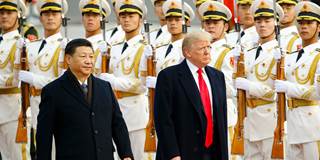Now that Chinese President Xi Jinping has solidified his position as China’s most powerful leader since Mao Zedong, he will be able to pursue his vision of a China-led international order. But if China wants to enjoy the benefits of regional or even global hegemony in the twenty-first century, it will have to prove itself ready to accept the responsibilities of leadership.
CANBERRA – Two parallel geopolitical narratives have dominated the twenty-first century so far: the relative decline of the United States since the end of the post-Cold War period; and the rise of China as an economic, political, and military power. How China behaves on the world stage will thus be a defining geopolitical factor in the decades ahead.
Looking forward, China’s strategic vision will most likely mirror that of its president, Xi Jinping, who has now consolidated his position as the most powerful Chinese leader since Mao Zedong. In his marathon address to the 19th National Congress of the Communist Party of China (CPC) on October 18, Xi proclaimed a new era of Chinese national strength, self-confidence, and global power.
Xi envisions a world in which China, having achieved geopolitical parity with the US, asserts itself diplomatically and assumes a larger role in writing the rules of the international system. Accordingly, the world should prepare for a surge in Chinese foreign-policy activism. To understand what form that activism will take, and what effects it will have on international relations, the insights of Project Syndicate commentators, who have long chronicled China’s emergence as a regional and global power, provide an invaluable resource.

CANBERRA – Two parallel geopolitical narratives have dominated the twenty-first century so far: the relative decline of the United States since the end of the post-Cold War period; and the rise of China as an economic, political, and military power. How China behaves on the world stage will thus be a defining geopolitical factor in the decades ahead.
Looking forward, China’s strategic vision will most likely mirror that of its president, Xi Jinping, who has now consolidated his position as the most powerful Chinese leader since Mao Zedong. In his marathon address to the 19th National Congress of the Communist Party of China (CPC) on October 18, Xi proclaimed a new era of Chinese national strength, self-confidence, and global power.
Xi envisions a world in which China, having achieved geopolitical parity with the US, asserts itself diplomatically and assumes a larger role in writing the rules of the international system. Accordingly, the world should prepare for a surge in Chinese foreign-policy activism. To understand what form that activism will take, and what effects it will have on international relations, the insights of Project Syndicate commentators, who have long chronicled China’s emergence as a regional and global power, provide an invaluable resource.